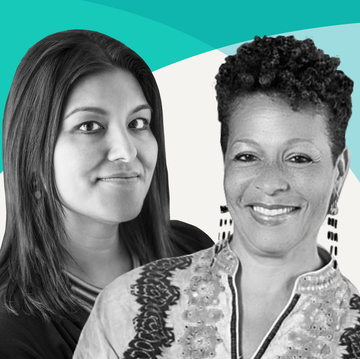How much should this single mom put down on a new home, keep in cash for emergencies, and tuck away for a secure retirement? Jean Chatzky, the CEO and founder of Hermoney.com, is sharing her advice for Beth, a newly divorced mom with two children. Beth’s overall financial goal is to maintain long-term financial stability while overcoming her fear of making the wrong decision.
For Donna, a 49-year-old mom and writer from New York, money has always been emotional. Fighting with her husband: Time to shop. Kids stressing her out: Amazon binge. But recently, the medicine stopped working its magic. Her credit is shot, she has zero money saved for an emergency, let alone retirement, and she’s facing a divorce.
Her goal is to keep her children in the house they’ve grown up in at a time when home values are soaring. In order to do that, she needs to refinance the mortgage into her own name (and give up half of her soon-to-be ex’s 401(k) in trade).
More From Oprah Daily

Things will be tight, but Donna has the income to make it happen. What she doesn’t have is the credit. Proving she’s worthy to a mortgage lender will mean making on-time payments for at least a year in order to up her credit score while simultaneously stashing away cash for unexpected emergencies.
Her money type: “Nurturer”
The way women approach money has a lot to do with how they were raised, their personality, and the influences in their lives. Donna took the HerMoney MoneyType personality test to unearth the drivers behind her spending and saving. What she learned was that although she may seem impulsive and irresponsible, her need to nurture is responsible for her overspending.
When a Nurturer has money, she loves to give and share the wealth. For Donna, that giving has always been focused on her kids, making sure they have everything she thinks they need to be happy and accepted, whether it’s vacations, $200 sneakers, or (sometimes expensive) sports and activities.
She’s also always the first to step up to donate to friends’ charitable efforts (and her own). That makes her feel good, but if she doesn’t keep close track of her donations, her goodwill could derail a sound financial future. “When I think about my money, I feel overwhelmed,” Donna says. “I want to feel at peace.”
How did it get this bad?
Donna’s unhealthy relationship with spending started around the time she had her first child. She knew she wanted to stay at home in the early years of childhood and left a full-time job with benefits to freelance and raise her kids. That meant hustling to find work, using her husband’s health insurance, and forgoing retirement savings to spoil her kids. It seemed to work, until her marriage began to fray and her husband lost his job. Money became a battle, and spending was her weapon. Two years of struggling, borrowing, and charging created an untenable situation. Instead of reining it in, Donna says she continued to take her family on vacations, sign up her children for activities, and spoil them. A few missed or late mortgage payments here, a couple of missed credit card payments there—she assured herself it wouldn’t matter as long as she and her kids felt good.
Now Donna is paying the price. She’s got a good job and a six-figure income and is no longer racking up new debt. In fact, she’s paid a lot of it back. But those impulses to spend still plague her.
A road map for getting back on track
Pam Krueger, founder of Wealthramp.com and cohost of the Friends Talk Money podcast, sees hope for Donna. What she needs, Krueger says, is a plan to help her stay on course and achieve the peace of mind she so desperately needs. Here’s what she suggests:
Step 1: Admit there is a problem.
We’ve all been there, says Krueger, using spending to feel better emotionally. But it tends to backfire. You spend to feel more in control but end up feeling guilty and reckless. Being aware of what you are doing and trying not to do it again is the first step to recovery. “I heard Donna flip the switch and say, ‘I aspire for more now that I’m getting divorced. I want a clean slate,’” says Krueger. “Now the question is, how does she clear a path and be a good example for her kids?”
Forgiving herself is a big part of that.
Step 2: Look at your situation realistically and by the numbers.
Keeping the home may not be the best financial decision for Donna. Cashing out and moving to a lower-cost location would set her up financially (keeping more in retirement to grow), but it’s not what she or her children want. That’s fine, but Donna should be clear-eyed about the expenses associated with owning the house.
“By keeping the house, she’ll probably tread water,” Krueger says. “It’s the taxes, insurance, and the cost of landscaping and maintenance.” If Donna makes—and keeps to—a plan for keeping up with all of these, she can manage.
Step 3: Prioritize your savings and your credit score.
To meet her goal of money peace of mind, Donna has to make a big effort to reduce her expenses in the first year and focus on cleaning up her credit. That means tracking every penny (for at least a couple of months) to figure out where money is leaking out of her budget, and paying every bill on time with an emphasis on staying out of credit card debt. Krueger also wants to see Donna have at least six months of expenses saved in an emergency fund, including mortgage payments.
Step 4: Don’t ignore retirement.
Donna still has many working years left. But with nothing saved for retirement, she needs to step it up. That means participating in her company’s 401(k) at least to the match (if it offers one), and setting up a Roth IRA to save more. Saving for her children’s college may seem like the natural next step, but amassing money for retirement has to come first. You can finance a college education, but you can’t borrow for your retirement.
Will she do it?
If Donna follows this road map, it will take about one year to pay down her debt, make on-time mortgage payments, and build up her emergency fund—then another two to five years to start saving for retirement and achieve the peace of mind she’s hoping for.
“This plan is dynamic. Life changes all the time,” says Krueger. “Let’s say she hits the milestones in year one and feels more in control of her life. She may love the feeling of money in the bank and never impulse-spend again.”
As for Donna, she says she’s ready for a change and is going to get serious about saving and paying down debt. “I realize how important my credit score is to my—and my children’s—financial future, and I’m willing to do whatever it takes to improve that,” she says. “Fighting the impulses to spend will be my biggest challenge, but I am ready. I have the income and resolve. Now I just need the time to follow this road map.”












